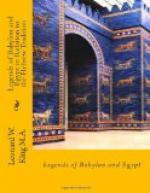V. THE FLOOD, THE ESCAPE OF THE GREAT BOAT, AND THE SACRIFICE TO THE SUN-GOD
The missing portion of the Fourth Column must have described Ziusudu’s building of his great boat in order to escape the Deluge, for at the beginning of the Fifth Column we are in the middle of the Deluge itself. The column begins:
All the mighty wind-storms together blew, The flood . . . raged. When for seven days, for seven nights, The flood had overwhelmed the land When the wind-storm had driven the great boat over the mighty waters, The Sun-god came forth, shedding light over heaven and earth. Ziusudu opened the opening of the great boat; The light of the hero, the Sun-god, (he) causes to enter into the interior(?) of the great boat. Ziusudu, the king, Bows himself down before the Sun-god; The king sacrifices an ox, a sheep he slaughters(?).
The connected text of the column then breaks off, only a sign or two remaining of the following half-dozen lines. It will be seen that in the eleven lines that are preserved we have several close parallels to the Babylonian Version and some equally striking differences. While attempting to define the latter, it will be well to point out how close the resemblances are, and at the same time to draw a comparison between the Sumerian and Babylonian Versions of this part of the story and the corresponding Hebrew accounts.
Here, as in the Babylonian Version, the Flood is accompanied by hurricanes of wind, though in the latter the description is worked up in considerable detail. We there read(1) that at the appointed time the ruler of the darkness at eventide sent a heavy rain. Ut-napishtim saw its beginning, but fearing to watch the storm, he entered the interior of the ship by Ea’s instructions, closed the door, and handed over the direction of the vessel to the pilot Puzur-Amurri. Later a thunder-storm and hurricane added their terrors to the deluge. For at early dawn a black cloud came up from the horizon, Adad the Storm-god thundering in its midst, and his heralds, Nabu and Sharru, flying over mountain and plain. Nergal tore away the ship’s anchor, while Ninib directed the storm; the Anunnaki carried their lightning-torches and lit up the land with their brightness; the whirlwind of the Storm-god reached the heavens, and all light was turned into darkness. The storm raged the whole day, covering mountain and people with water.(2) No man beheld his fellow; the gods themselves were afraid, so that they retreated into the highest heaven, where they crouched down, cowering like dogs. Then follows the lamentation of Ishtar, to which reference has already been made, the goddess reproaching herself for the part she had taken in the destruction of her people. This section of the Semitic narrative closes with the picture of the gods weeping with her, sitting bowed down with their lips pressed together.
(1) Gilg. Epic, XI, ll. 90 ff.




